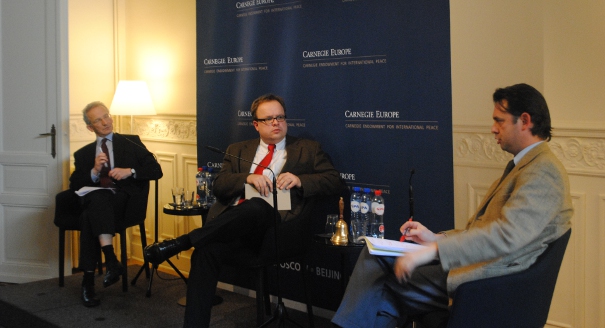Registration
You will receive an email confirming your registration.
IMGXYZ3462IMGZYXWhile the European Union focuses on the efforts to save the euro, its foreign policy arm, the European External Action Service (EEAS), is struggling as well. The realization of the full potential of the Treaty of Lisbon's foreign policy reforms is being jeopardized by an atmosphere of crisis and loss of confidence. In addition, the EEAS still suffers from a number of design flaws and, crucially, there is a lack of genuine buy-in on the parts of key stakeholders, such as the member states and the European Commission. In his new policy outlook, More Action, Better Service: How to Strengthen the European External Action Service, Carnegie Europe's Stefan Lehne takes an in-depth look at the structural problems facing the EEAS and proposes concrete strategies to redress its shortcomings.
To mark the launch of this publication, Carnegie Europe hosted a lunchtime debate with Lehne and Anton La Guardia, European Union correspondent for The Economist, who discussed how to overcome the flaws of the EEAS and make the vision of Lisbon a reality. Carnegie's Jan Techau moderated.
EU Foreign Policy and the Financial Crisis
The financial crisis has prevented a strengthening of EU foreign policy since the adoption of the Lisbon Treaty, Lehne and La Guardia agreed. Lehne identified five ways that the financial crisis is negatively affecting EU foreign policy:
- Distraction: The political leadership’s preoccupation with the financial and sovereign debt crises is leaving foreign policy idle instead of producing substantial policy on other major current issue such as Libya and Syria.
- The Cost of Soft Power: Lehne argued that the EU’s soft power approach requires significant costs, which is exacerbated by the EU’s internal crisis and undermines its external leverage and credibility. Additionally, La Guardia argued that the EU’s soft power, value-based approach lacks credibility and leverage as long as the financial crisis persists.
- Resources: In light of austerity measures, foreign policy, with its high expenses, has been reduced to a minimum.
- New Divisions: The current crisis also negatively affects EU unity. With members opting out of integration projects like the fiscal pact, the crisis raises also the question of possible disengagement from foreign policy.
- Undermining Lisbon: Importantly, the financial crisis created an environment of constraint and insecurity that threatens the realization of the foreign policy reform aims pursued in the Lisbon Treaty.
Realizing Lisbon’s Potential
Lehne outlined key issues that must be addressed in order to capitalize on the potential inherent in the EEAS:
- Enhance Member State Buy-in: To overcome the existing rivalry between national diplomatic services and the EU foreign policy arm, member states must to be supportive and be engaged. This could be done by directly tasking EU foreign ministers in order to integrate them into the EU process or by fostering cooperation between EU delegations and national embassies.
- Coherence: A successful EU foreign policy has to integrate emerging issues such as climate change and migration, which are currently scattered across the portfolios of different EU institutions. In addition, the goal of making the EU a comprehensive foreign policy institution by uniting the foreign policy leadership of the EEAS and the Commission under the responsibility of one person failed, in part, due to resistance within the Commission.
- Leadership: The EU’s new scope for foreign policymaking under Lisbon requires strong leadership both to set priorities and to allocate limited resources to achieve those priorities. La Guardia argued that the diverse regional and topical interests of EU member states prevent true prioritization.
- Institutional Capacity: There are currently fewer people working on foreign policy than before the Lisbon reform, Lehne said. This stems from the lack of manpower and resources, which used to be supplied by the rotating presidency that drew on member states’ capacities and heavy investment during their six-month stints. Additionally, existing top-heavy organizational structure and procedures need to change to allow for the ability to react rapidly to changing circumstances.
- Communication: La Guardia added that successful foreign policy depends on the ability of an institution to communicate its message, which he feels the leadership of the EEAS has proven unable to do. Lehne added that he feels this inability to communicate is a problem in the EU generally. Lehne argued that the different organizational cultures within the Commssion and Council and their clash with the EEAS specifically also needs to be overcome.
Reasons for Hope
- Teething Problems: Some of these problems are inherent to all new organizational structures, Lehne said. Uncertainty and friction can be overcome as the organization becomes more established.
- EU Delegations: The EU delegations—one of the well implemented reform projects of the Lisbon Treaty—can potentially overcome the difficulties of coordinating EU foreign policy by bridging trade and development competencies and other foreign policy competencies.
- Re-engagement in Foreign Policy: The lack of foreign policy over the past month is not sustainable in light of mounting global challenges.
Time for a New Strategy?
Lehne asserted that there is a clear need for continued reflection on EU foreign policy, but noted the risk of not being able to implement any new concept under the constraints of the financial crisis. Drawing a parallel with NATO’s new Strategic Concept, La Guardia stressed that fundamental policy strategies, new or revised, must show realism by matching resources and objective.
